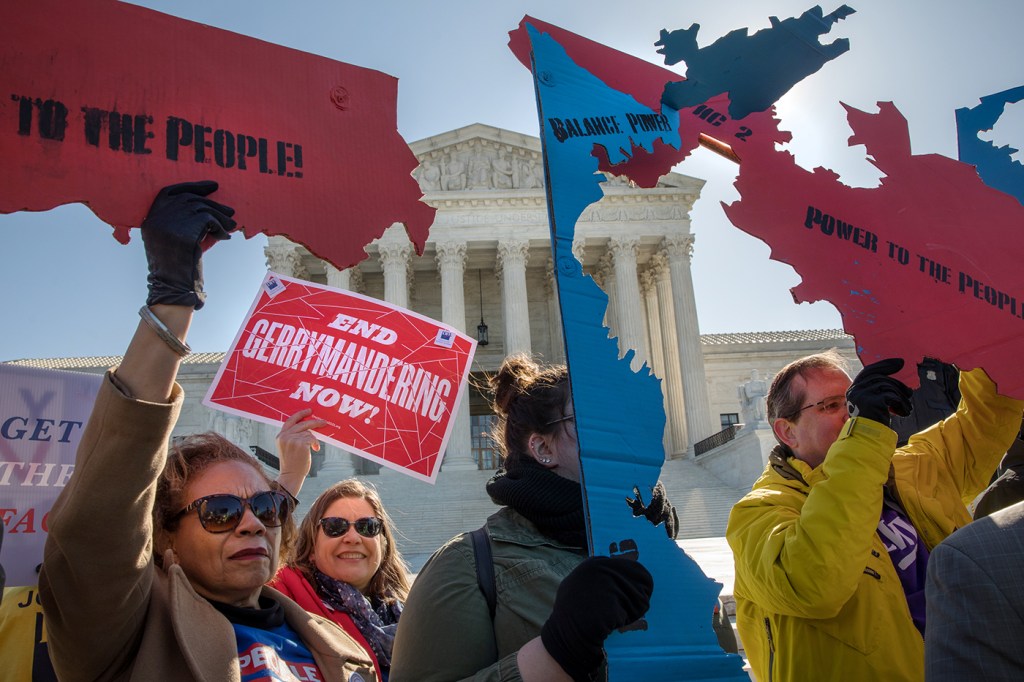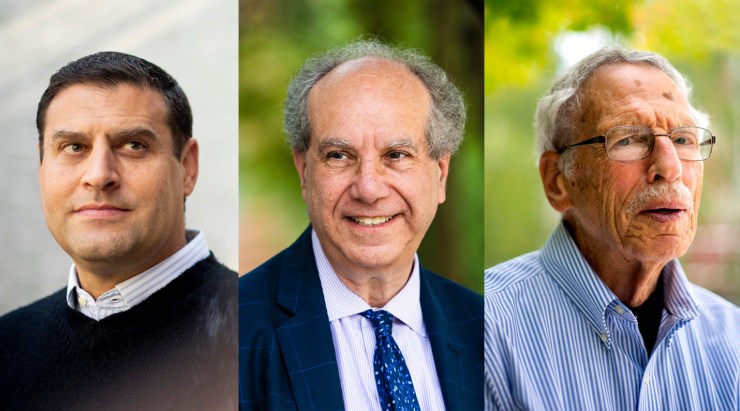Gerrymandering case headed to the Supreme Court ‘holds the potential to destroy American democracy,’ Northeastern professors say

Several Northeastern law professors are sounding the alarm on a case about gerrymandering headed to the U.S. Supreme Court this fall that could erode American democracy.
The case in question, Moore v. Harper, centers on the Republican-controlled state legislature in North Carolina, which drew congressional districts in favor of conservatives. The North Carolina Supreme Court concluded the maps were unconstitutional and gerrymandered in such a way that they gave Republicans an “extreme partisan advantage by diluting the power of certain people’s votes.”
At the heart of the case is the independent state legislature doctrine, a legal theory that suggests that under the U.S. Constitution, state legislatures have the exclusive power to regulate federal elections without interference from other institutions, explains Michael Meltsner, the George J. and Kathleen Waters Matthews Distinguished University Professor of Law.
Currently, state courts have the power to step in if they determine election maps violate state constitutions or other political districting laws, making judiciaries a powerful check on partisan legislatures and their efforts to gerrymander, he says.
Although this doctrine has been shot down by federal courts for more than 100 years, those who oppose the widely criticized legal theory fear it could be given weight by the conservative-supermajority Supreme Court, leading to “a major change in the way states regulate fairness in drawing election districts,” according to Meltsner, a national leader in the fight for civil rights.
“At least four justices have already indicated they may adopt the theory with the possible result that partisan gerrymandering would go unregulated and voter protections found in state law would be ignored,” Meltsner notes.
Professor of law Dan Urman points out that courts exist for a reason: fairness. However, despite judiciaries serving an important role as a check on “the excesses of democracy,” this crucial function could be undermined depending on how the Supreme Court rules in Moore, he explains.
“It can basically eliminate, curtail, limit, take out the meaningful judicial role in democracy,” Urman says about the case. “It’s very disturbing.”
Urman, whose courses explore the intersection between law and politics, explains how a ruling in favor of the independent state legislature doctrine would serve as a way both for conservatives to maintain power in Congress and keep in place recent legal wins from the Supreme Court.
Typically, the Supreme Court makes changes incrementally to maintain credibility and allow the American public time to adjust to shifts in the law, Urman explains. However, in its latest term, the court issued rulings that implemented conservative principles with an urgency that surprised a lot of people, according to Urman. From overturning Roe v. Wade to expanding gun rights, the court moved “really quickly and really far,” he notes, “and next term is the sequel.”
“This next term basically has the chance of locking in all of the moves that the Court has made this previous term, by making it harder to alter the political circumstances on the ground,” Urman says. “This is the game that is being played. The first step is to rig the game, and the second is to say, ‘Go play.’ ”
“I would argue that if you rig democracy, it’s tilting the pinball machine, and one side always wins,” he adds.
Jeremy Paul, a Northeastern professor of law, does not mince words in describing the possible impact of Moore, noting, “It holds the potential to destroy American democracy.” He agrees with Urman that a ruling in favor of the independent state legislature doctrine would have a lasting impact, ensuring one-party rule and rendering elections “virtually meaningless.”
If a state is already gerrymandered, meaning its legislature is constituted in such a way that it does not reflect an accurate proportion of its population, the party that holds power will remain in control of districting and continue to draw maps that favor that party for the years that follow, Paul explains.
“And if they’re allowed carte blanche to do whatever they want, then the state will never be able to change its [election] rules and you will basically encourage one-party rule in all of these states permanently,” he adds.

Under the independent state legislature doctrine, the only check available on state legislatures’ districting would be the U.S. Congress, which could pass restrictions against gerrymandering, according to Paul. However, because of the filibuster rule in the Senate, it would be nearly impossible for either party to muster the required 60 votes to make such regulations a reality.
Additionally, under a system that prohibits state courts from stepping in and ruling against election maps they deem unconstitutional, state governors would also not be allowed to have a role in districting. Currently, in states where the legislature and governor are of different parties, this division tends to lead to compromise in the districting process, according to Paul. However, if the governor were to have no power in this process, then the legislature would again have complete control over districting, leading to “no checks and balances,” he points out.
Having no checks on the state legislatures’ creation of electoral maps and having one-party rule in perpetuity would have the most harmful impact on any group that is “residentially concentrated,” according to Paul, as gerrymandering would likely be directed at diminishing their voting power. This means that voters of color would likely suffer the most and white rural voters the least, he explains.
“It’s very horrifying,” Paul says.
For media inquiries, please contact media@northeastern.edu.





